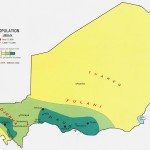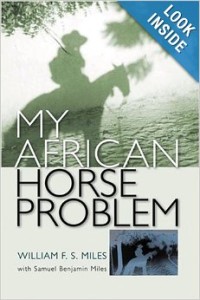William F.S. Miles (Niger 1977-79) "A Used Book, a Lost Era"
The back page of The Chronicle Review always has a thoughtful short essay written by an academic (yes, some academics can write) and it is usually what I turn to when the weekly Chronicle of Higher Education arrives. (This publication, by the way, is one of the best edited papers in the U.S.)
The November 8, 2013, issue has an essay entitled “A Used Book, A Lost Era” by William F.S. Miles (Niger 1977-79) that tracks how he found a used copy of R.C. Abraham’s 992-page Dictionary of the Hausa Language, that he had as a PCV in Niger, and that he would use later when he was a Fulbright Scholar in Niger.
He found a used copy of Abraham’s dictionary on sale at Amazon for $25.
He bought the book and he writes with great feeling and great regret:
I opened the shipping packet with the kind of anticipation usually reserved for reuniting with an old friend. I pulled the book out slowly, carefully, lest I wrinkle or tear the dust jacket. The front cover was as bright an orange as I remembered. But then my heart sank as I processed the meaning of the purple-inked notice on the jacket. There it was again, even more firmly stamped on the front cover and on the book’s first and last page: “Property of Peace Corps Niger.” In my hands, I realized, I was holding a facsimile of the very same book I had left behind in Africa, this other rare copy having served as a reference for countless volunteers and staff in the Peace Corps headquarters in Niamey. It was also the ultimate, tangible evidence of the end of an era.
Miles writes that two years ago, in response to an attempted kidnapping of a French volunteer in the capital by the Al Qaeda in the Islamic Maghreb, the Peace Corps suspended its program in Niger. The Peace Corps was just months shy of celebrating 50 years of continuous service in the country.
Miles writes that today “thanks to Amazon and Al Qaeda, I found myself refilling the empty space in my bookcase with an artifact from my idealistic past” though he sums up that it hurts him to realize that while the Hausa-English dictionary helped him “navigate the complexities of Niger’s culture” today it is “being discarded along with the rest of JFK’s brainchild in that unjustly beleaguered nation.”
A “strange karma” Miles adds, “of online book selling and international terrorism” brought Abraham’s book back to him to “preserve and protect — and for Niger and the Peace Corps — to mourn.”
My African Horse Problem
by William F. S. Miles (Niger 1977-79) with Samuel B. Miles
University of Massachusetts Press
2008
$22.95
As someone who has spent 10 years of his life in Niger and who knows Bill Miles well, I am very pleased to see this piece about his article on finding his old Hausa dictionary. As said in Hausa, “akwai kyau” (possessing much good), I salute him for this unusual contribution to the annals of Niger’s Peace Corps history.
Bill also found a copy of my doctoral dissertation for sale on the street in Niamey stamped with the stamp property of Irsh-the primary social science research in Niger . Good to know that that work,donates by me to Irsh has some value for someone.